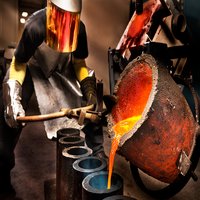Transnational Decarbonization Club for the Steel Industry
Wuppertal Institute's concept for innovative international cooperation awarded and recommended to the US government

Wuppertal Institute's concept for innovative international cooperation awarded and recommended to the US government

In the run-up to the inauguration of U.S. President Joe Biden, the U.S. project "Clean Economy Employment Now" (CLEEN) collected the best ideas for implementing the Green New Deal from scientists and civil society actors across the globe. The collected ideas were integrated into a database and handed over to the new U.S. administration. The Wuppertal Institute was also involved in the project and submitted ideas. Prof. Dr. Manfred Fischedick, Scientific Managing Director of the Wuppertal Institute, serves as a Member of the CLEEN Project's advisory board.
One of the ideas submitted by the Wuppertal Institute has now been selected as one of the top 3 ideas in thematic issue of "International Partnerships to Unlock and Accelerate Pathways to Global Decarbonization". Dr. Lukas Hermwille, Senior Researcher in the Global Climate Governance Research Unit at the Wuppertal Institute, proposed that the White House should use its convening power to establish a transnational decarbonization club for the steel industry. The U.S. government should partner up with the European Union, India, China or, even subnational governments of individual federal states or provinces. Of course, the decarbonization club should also include steel makers as well as companies that produce machinery and equipment for the steel industry, and companies with a high demand for steel – for example from the automotive industry.
To date, steel production accounts for about eight percent of global CO2 emissions. "Members of a transnational climate club would have to commit to completely decarbonizing steel production by 2050," explains Dr. Lukas Hermwille. To achieve full decarbonization, companies would have to commit to no longer investing in new conventional production facilities from 2025. In addition, such a club could provide a framework to support companies taking on the huge required investments in still unproven and therefore high-risk zero carbon technologies. "In addition, such a club could help to establish a lead market for zero-carbon steel and thus also create an incentive for necessary investments on the demand side," adds the author.
The concept of the transnational climate club was developed as part of the EU funded research project COP 21 RIPPLES (Grant Agreement No 730427). The paper "Exploring the Prospects for a Sectoral Decarbonization Club in the Steel Industry" and further information can be found in the following links.
